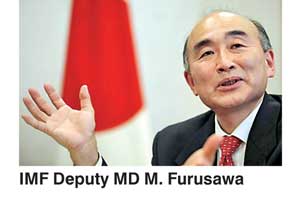Saturday Feb 21, 2026
Saturday Feb 21, 2026
Thursday, 13 July 2017 00:07 - - {{hitsCtrl.values.hits}}
By Uditha Jayasinghe
in Jakarta
Strengthening tax collection to a threshold of 15% of GDP is critical for Asian countries to accelerate growth and achieve sustainable growth, a top International Monetary Fund (IMF) official said here yesterday. 
Even though Asia’s outlook remains the strongest in the world, the region is lagging behind in tax collection with many South and East Asian economies routinely collecting insufficient tax to sustain growth, observed IMF Deputy Managing Director Mitsuhiro Furusawa at a conference titled ‘The International Tax Dimension of Economic Growth in Asia’.
Growth in the region is expected to reach 5.5% in 2017, after slowing last year. However, compared to other regions in the world, tax revenues are relatively low in Asia. As with Sri Lanka many countries in the region including Indonesia have low tax collection at about 10%-12% of GDP. But this comes at a cost. Analysis recently conducted by the IMF Fiscal Affairs Department suggests that there is a minimum tax-to-GDP ratio associated with a significant acceleration of growth and development.
“We estimate threshold at a ratio just below 15 percent. That is largely in line with the Fund’s standard recommendation,” Furusawa said.
Sri Lanka is projected to hit 16% of GDP in 2020, provided it can pass proposed reforms including the pending Inland Revenue Act, according to the World Bank.
Strengthening revenue mobilisation is likely to require a wide range of measures including both policy and administration. In domestic taxation, it could involve making the Value-Added Tax more effective, for instance, and developing property taxation. The IMF is working with many countries to reform their tax collection systems but, as with Sri Lanka, it has been a challenging process.
“Revenue mobilisation can provide the resources needed to advance the economies of Southeast Asia and help meet important social objectives. Inclusive growth, resilience, and cooperation: these are the goals you need to keep in mind while addressing the issues attached to international tax policy.”
But Asia faces significant challenges. In the short run, there is uncertainty about the direction of economic policy in some advanced economies, especially the risk of inward-looking policies that could affect regions like Southeast Asia that have benefited from global economic integration, Furusawa warned. Global supply chains and tech companies also pose difficulties to evolve an equitable international taxation policy.
The IMF Deputy Director also outlined several hurdles that could affect the South East Asian region. Although the normalisation of Fed policy so far has proceeded smoothly, it still poses a risk. This is especially the case for borrowing costs in regional economies where private debt has risen over the past decade.
There also is the potential for renewed market volatility—both because of the changing monetary conditions and unexpected turns in China’s economic rebalancing.
Then there are the longer-term challenges. These include the trillions of dollars in infrastructure investment that will be required if Asian countries are to achieve advanced economy status.
“There will also be demands for increased spending on education and other public goods to make growth more inclusive. In addition, some countries will need to address the implications of demographic change, especially the rapid ageing of populations that carry implications for health care and pension spending.”
Many Asian countries—including Sri Lanka—face the policy challenge of sustaining and accelerating inclusive growth at a time of lower commodity prices. This will require further economic diversification, the IMF official said.